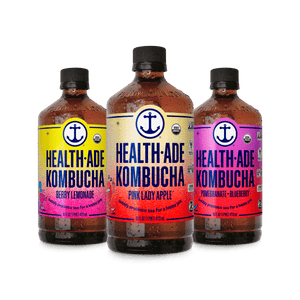
Kombucha | 12 Pack
Fan Favorite Variety Pack
One-time Purchase
49.95

Copied URL to clipboard!
As Earth Day approaches on April 22nd, it’s the perfect time to reflect on how our everyday choices—especially around food and waste—impact both gut health and the health of the planet.
In this blog, we’ll explore some simple (and fun!) ways to make small changes that support a healthier, more sustainable world—from your digestive system to the environment around you.
“Going green” isn’t just about being a mindful consumer—it’s also about making nourishing, sustainable choices for your body. Incorporating more greens into your meals and snacks can work wonders for your gut health. Leafy green vegetables like spinach, kale, arugula, collard greens, romaine, and swiss chard are rich in antioxidants and prebiotic fibers that help fuel a strong, diverse microbiome. And don’t forget about one of the tastiest green fruits: kiwis! Studies show that habitual kiwifruit consumption has positive effects on digestion, including alleviating constipation and improving upper GI symptoms (1, 2).
Growing your own herbs is also a win-win for your gut and the planet. Fresh herbs like parsley, mint, and basil are packed with nutrients that support smooth digestion. Growing these at home also reduces the need for store-bought packaging and transportation which cuts down on waste and helps you reduce your carbon footprint. Plus, potted herbs can add a vibrant pop of color to your porch or windowsills!
And of course, sipping kombucha is another easy way to show your gut some love. With living probiotics and organic acids that support your gut health, drinking Health-Ade Kombucha can be a simple and refreshing ritual that benefits your body. And when that Health-Ade bottle is empty, it’s perfect for upcycling into something useful (or beautiful) around the house.
Upcycling is a great way to minimize waste, conserve resources, and reduce the environmental impact of constantly producing and discarding new items. Here are a few of our favorite upcycling ideas:
Repurpose your Health-Ade bottles. You already know that every bottle of Health-Ade kombucha is filled with delicious flavors and bubbly probiotics, but the goodness doesn’t have to end once it’s empty. Give your bottle a rinse and reuse it as a vase for cut flowers or to propagate new house plants! You can also fill leftover bottles with your favorite cleaning products, screw on a spray nozzle, and use for spring cleaning. Lastly, try pouring olive oil into one and balsamic vinegar into another to use for homemade salad dressings and drizzles.
Blueberry syrup anyone?

How about a new soap dispenser?!

Check out more fun bottle upcycling ideas!
Compost food scraps. Instead of throwing away all of your food scraps, start composting them! Items like eggshells, coffee grounds, grains, vegetable peels, and fruit rinds can all be composted and turned into nutrient-rich soil to nourish your garden or house plants.
Buy in bulk. When possible, purchase food and household items in bulk to reduce packaging waste. Bring jars and other containers to the store when purchasing items like bulk grains, nuts, and spices—and don’t forget those reusable shopping bags!
Get creative with leftovers. Repurposing leftovers is easy (and delicious!) way to reduce household food waste and save on your grocery bill. And no, it doesn’t have to mean eating the exact same meal twice.Consider transforming rotisserie chicken scraps into a nutritious broth for soups or toss leftover veggies into a skillet with eggs for a colorful morning frittata. You can also repurpose stale bread into croutons for spring salads, freeze and blend slightly overripe fruits into smoothies, or create a leftover stir-fry with veggies, a protein, and soy sauce!
Here at Health-Ade, we're committed to helping you feel good from the inside out. And we know that supporting companies that are kind to the planet plays an important role in helping you feel good. Our Sustainability & Company Responsibility Committee leads the charge on initiatives like waste diversion, carbon footprint reduction, water stewardship, and donations (both monetary and product-based). Here’s a look at some of the progress we made in 2024:
We also proudly donated over $145,000 to the following organizations in 2024
If there’s one thing to keep in mind this Earth Day, it’s that sustainability doesn’t have to be overwhelming. Start with one change at a time and celebrate your progress along the way! Whether you’re adding in a greater variety of plant-based and fermented foods to your diet or upcycling to reduce your household waste, small changes can make a big impact on both your health and the health of the environment. Show kindness to your gut and the planet!
Sources: